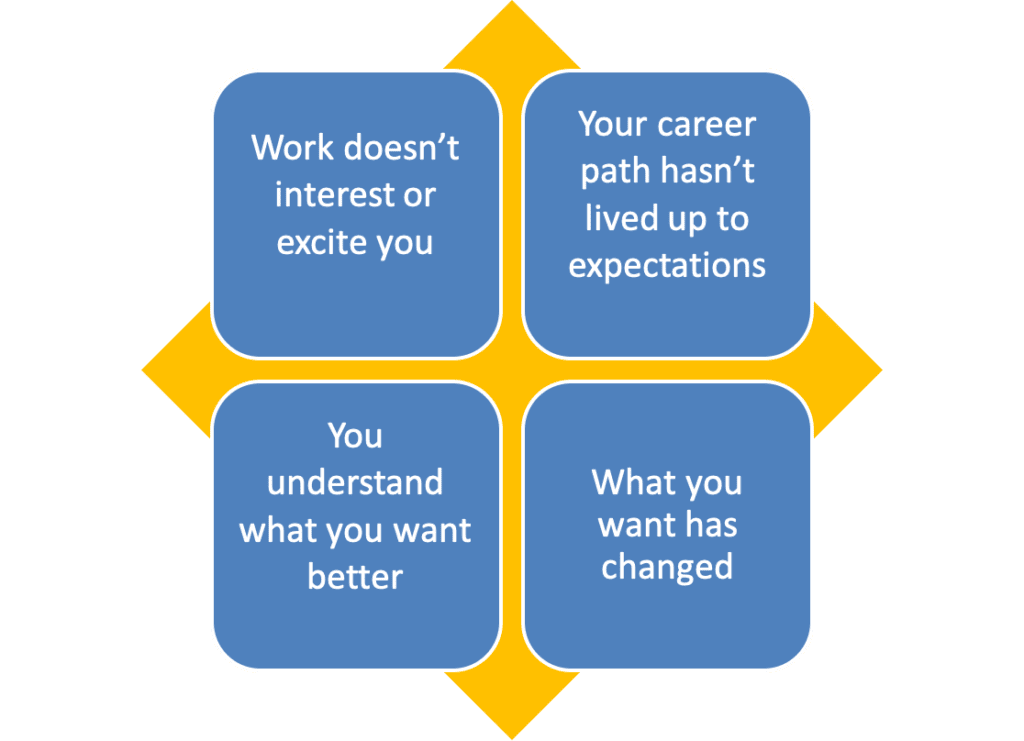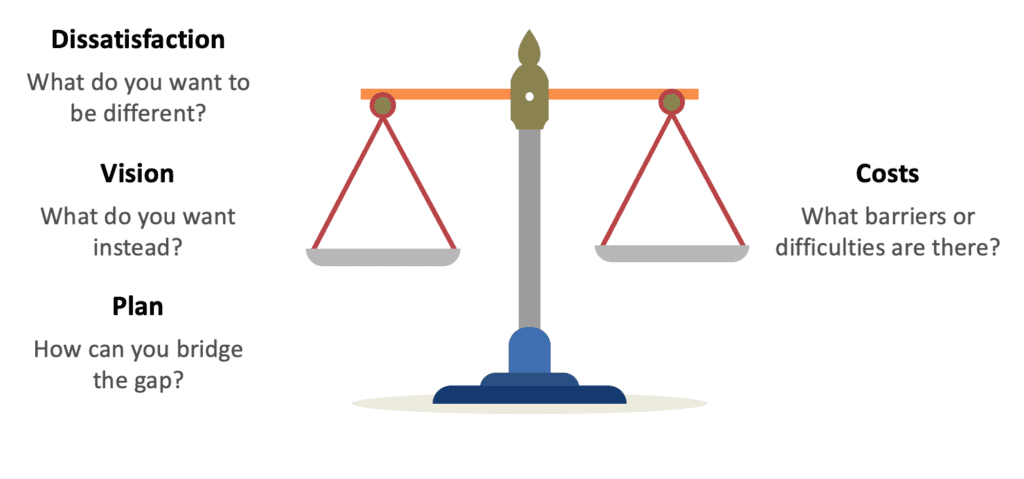Deciding to start a new career isn’t the easiest thing to do. While many people change jobs, making a change to something completely new can feel difficult to achieve. In this article, we’ll go through a step by step process to help you move toward and start a new career.
Why we want to start a new career
When I speak to clients who want to start a different career, it’s usually because their present career isn’t matching up with what they really want.
You can see this when:

- Your work doesn’t interest or excite you
- Your career hasn’t lived up to expectations – maybe things are different than expected, or things around you have changed
- Or perhaps you now understand what you want better
- And sometimes, it’s simply that what you want has changed
Unless we do something about this, it can have a big impact on our job satisfaction, happiness, our career success, even our health and wellbeing.
If you’re feeling unhappy in the work you’re doing, you’re not alone. Career satisfaction research shows that 47% of workers in the UK aren’t happy in their job and that number increases to 65% for millennials.
What we really want
At the start of our careers, there’s a lot we don’t know about what to expect, or what we want. It’s easy to focus on salary, the status of the company or job title, or training. I’ve asked many hundreds of graduates at the start of their career about what they wanted and salary was the number one motivation.
Salary is important to your career, but it’s only one factor, and other things take more importance as we progress in our career – we want things we didn’t realise we wanted. As we get older, we can focus less on external career motivations (e.g. salary, training) and more on internal (e.g. work life balance, we want to be more creative, have more decision making power, or work within our values)
When was the last time you considered what is really important to you?
Why starting a new career can feel difficult
It can feel really hard to start a new career or try something different. It seems easier for you to stay in the same career path. It’s more obvious where you can go, what your options are and where to find different opportunities. By staying in the same career your experience is clearly relevant, and recruiters may give you more attention when applying for jobs. So you might consider that it’s easier to stay on that track. It’s comfortable, familiar.
Walk off the path to start a new career and it’s not clear what’s out there. It’s like you’re walking off the edge of the map. What else could I do? What are my options? How do I make a change? Here Be Dragons.

It may also feel difficult to convince an employer that as a career changer, you are the right person for the job. After all, many employers will look at whether you have done the work before, when choosing whether to hire you. While some employers are more open to considering applicants with different experience and skills, this resistance can feel off-putting when you’re trying to make a start in a new career. It can sometimes stop us even before we’ve tried.
The fear factor in career change
It’s perfectly normal to be concerned about starting a new career. Let’s be honest about what these concerns are. Fears. Fear of not being sure what you really want. Fear that you can’t earn a living, Fear that it won’t work out, that you might look like a failure. So part of us wants to stay with the career we know. It’s safer that way, right?
Are you going round in circles?
With all of these thoughts, it’s very easy to go round in circles. Thoughts like these are extremely common:
- I’m unhappy in my career
- I want to start a new career doing something I enjoy
- What could that be?
- I don’t know what else I can do for a career
- I’m not sure I can earn a decent living doing something else
- I can’t see any jobs in the area I’m interested in
- I have applied for different jobs but had no success
- There’s too much competition
- Employers won’t consider me, and starting my own business feels too hard
- I don’t think I can make a change, so I’ll stay where I am
- …But I’m unhappy
Step 1: Break the career change circle
As we’ve seen, part of the reason it feels difficult or that we’re going round in circles is our own thinking. We have uncertainty, mixed feelings, lack of knowledge, assumptions we’re making about what the reality is or what’s possible.
So the first step is to break out of the circle. If you want to do this, make a clear intention that you’re going to explore a new career properly. No more half-hearted thoughts, wishful thinking or flip flopping or closing down your own thoughts and ideas. If you let them carry on, nothing is going to happen. Ever.
To move forward and start off in a new direction you need to make a decision about whether changing career or looking for a new career is really what you want. You’re going to be uncomfortable, uncertain. Your comfort zone will be stretched a great deal. But you can also have fun with exploring new and different careers, why not? You get to make a conscious decision about your future and what you really want to do. Isn’t that liberating?
Step 2: Be clear on what’s keeping you stuck
There’s a formula for change which explains these different forces, and it can help you work out if you’re really ready for change and a fresh start in a new career. The formula can also help you consider how important this decision is for you. Is it something that would be nice to do, or something really important to you?
The following is a simple equation called the Formula For Change which you can apply to a career change, but also other decisions in life, to help you decide whether you want to do it or not. We’ll use it to help you be certain that you really do want to start a new career, and work out where you’re getting stuck. The formula is:
D x V x P > C
Don’t worry if you’re not a mathematician. I’m not either! Here’s what the different parts mean.
D = Dissatisfaction with your career
To make a career change, you must be unhappy with the present situation, otherwise you won’t feel motivated to do anything different or go off and start a new career or try different things. The clearer you can be about what’s not working in your career, and why that might be, the better.
V = Vision for a new career
You need a vision of what kind of career you want instead, or where you might want to be. What do you want to be different? Do you have ideas for a new career yet? What kind of career might you want to start? You also need to be clear on why it’s important to you? If it’s not that important, you won’t make the effort to seek a different life or change of career direction.
P = Plan to change career
You need a good action plan to make this change happen for you. If you don’t have any clear goals or plans to make your new career happen, nothing will happen. Now for people who really don’t like to plan, there is an approach called ‘planned happenstance’ which is a very different way to explore careers, seeking lots of new experiences and interactions with others and keeping an open mind to what turns up. This can work for some people, however there is still some element of planning, of intention.
C = Cost of changing career
You need to be clear about what it will cost you to make this change? Not just from a financial point of view, what other barriers are there that you have to overcome? What are the different perks or benefits of your present career or job which you might not like to lose? These could become barriers to change, and are often the things that will keep you stuck if you don’t find a way past them. An important thing to consider as well, is if these barriers costs are really as they appear to be? We often make assumptions about them, and they can sometimes appear larger or smaller than they really are. So getting an accurate assessment is important.
D, V and P together create your desire to change career. However, for the change to happen, your desire needs to be greater than the cost of changing (C).
I like to think of it a bit like a set of scales, and you’re trying to balance your desire to make a change and start something new on one side against what’s stopping you on the other, like the diagram below.

If it all looks a bit off-putting, don’t worry! It’s likely that whatever is missing from your career change formula is the very reason you haven’t started a new career yet.
Step 3: Assess which parts are missing or unclear
When you want to start off in a new career direction, most of these different factors for change aren’t clear. We have a few ideas about what’s making us unhappy, but we often don’t know much about the rest.
If you and I were mathematicians, we’d be trying to find out what the missing number or value is here, so we can work out the answer. But as this is a life problem, the things that are missing often show up as questions or obstacles. You may find you’re asking yourself questions like these:
- What do I want?
- What else can I do?
- How can I start a new career?
- How would I put food on the table whilst I’m trying to make a change?
Or they might show up as blocks:
- I can’t do anything else
- I can’t afford to do the training
- It’s too risky
- Who would employ me?
- I couldn’t start a business
- I can’t afford to take a salary drop
The good news is that we can answer these questions, and get past these blocks. You just need to focus on small steps, stay motivated, and believe (and know!) a career change is possible.
And of course, if once you’ve explored these options you decide that making that change isn’t worth it for you, that’s fine. Most people don’t NEED to start a new career, it should be something you do because there’s something you value out there which you don’t have at the moment. According to coach Tony Robbins, “Achievement without fulfilment is failure.”
Step 4: Fill in the gaps
If you’re really unhappy in your career but you don’t have a vision or a plan for what next, then you might feel but you’ll be leaping into the unknown. So you need to start working out what you want instead, and trying to actively find out how to make this work.
On the other hand, if you have a clear vision and you know how to make a career change but can’t bring yourself to do it, maybe something else is going on. Are the costs seen as too high for you, for example a salary drop you think you will need to take? Or maybe you believe there are no jobs out there. Or maybe you’re not as dissatisfied with the work and you have mixed feelings about leaving your current career path.
Here’s how to assess each of the factors.
Dissatisfaction
- Are you unhappy enough to make a change?
- Does your job satisfaction come and go depending on your workload?
- Is your dissatisfaction centres on a particular person, or a specific department/firm? (and changing this would solve the problem?)
- Are there some benefits or perks which you want to hold on to or worry about losing? Like salary, stability, convenient location…
If this is the area which is missing for you, or you have mixed feelings, this could put the brakes on you ever making a change.
How to be clear about your career satisfaction
Start a pros and cons list about your job. Write down what you like, what you dislike and be honest about every aspect of the work. Not just salary, consider many other aspects such as opportunities for progression, autonomy, relationships with colleagues, security and work/life balance.
My career satisfaction questionnaire can help you assess what you’re most unhappy or happy with about your work, identify what’s missing for you and help you identify what would make you feel happier in your work. You can get this for free, see the link at the bottom of this post.
Vision
- Are you unsure what you really want?
- Are you blank on what your other options are?
- Do you find yourself firefighting, focused on what’s going on right now, and never thinking about the future?
It is possible to come across new opportunities by chance, as discussed earlier. However, unless you consider what you really want, you might not know the opportunity when you see it.
How to create your career vision
It’s important to spend some time away work and other daily concerns – thinking about what kind of future you want. Start a vision board or write notes somewhere you can see every day. Keep adding to this over time as you become clearer on what’s important to you.
I have some great exercises which can help you do this which I share through my newsletter and blog to give you regular inspiration.
Plan
- Are you unclear on how to make a change?
- Do you have ideas but aren’t sure how to get there?
- Is there something in your plan that you can’t achieve?
Creating your plan is usually easier after you have a vision to work towards, but it may also be a plan of necessity, if you need to make a short-term move while you’re trying to work out your longer-term vision, for example if you’ve been made redundant.
Developing your career change plan
It’s hard to have a plan until you know your end goal, which is why it’s often a problem in career change when you start out not knowing what the end goal will be!
A plan should ideally come later in the process once you’re clear where you want to go out and why. If you’re at that stage, here are some ideas you could use when creating your plan:
- Try to define specific steps you might need to take
- Measure the gap between where you and where you want to be. Consider if you need specific skills or experience that you might need to acquire, and how that can be done.
- Do you need more knowledge or insight into the new career you’re considering? Who can help you gain that?
- Consider the time frame for making a change, and whether adjusting this might make things more achievable
Costs of making a career change
Are you feeling stuck because the barriers to you changing seem huge? Perhaps you’re concerned you won’t earn the same salary. Or you’re too old to make a change. You don’t have enough (or any) experience. Or you don’t have the funds to retrain.
Some of your concerns about these ‘costs’ can be quite reasonable and sensible. However, there may be concerns that are unfounded or based on information or a viewpoint that is not entirely correct. So getting to the truth is important before they make you abandon your plans to start a new career.
How to assess the costs
Often there are ways around what seems like an insurmountable obstacle.
- Ask yourself – how do I KNOW that to be true?
- Do your research – gather facts, not assumptions
- Talk to people who know the career you’re interested in
- Consider what’s most important to you, what you’re willing to be flexible about, and what you’re willing to trade to get something you really want
- Ask yourself – if that happened, what would I do then? Try to solve that problem before you give up. It might surprise you how resourceful you are!
Get my free career change resources
If you’re thinking about starting a new career but feel stuck, I hope this article has helped you see things a bit differently and understand how to take a more structured approach. It may have raised a number of questions or made you consider how to move forward.
You don’t have to do all this work on your own. As a career coach I can help you find answers to these questions, help you create different ideas for a career change and create a clear plan for how to get where you really want to be.
I’ve created a few resources to help you work through the questions in this article, and help you become clear on how to move forward with your new career.
You can get these free resources by subscribing to my newsletter.
If you’re considering starting a new career, and would like some more support, please contact me. We can talk about what’s happening for you right now, what is getting in your way, and how to get started.
